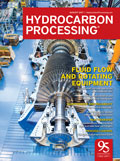
Special Focus: Fluid Flow and Rotating Equipment
A system of compressors powered by surface condensing steam turbines is inherent in the operation of a typical ethane cracker unit.
Shipping pumps with 1,800 hp are equipped with five cooling fans that cool the oil going to the lube oil pumps to lubricate the bearings.
In all sectors of industry, the measurement of flow is of vital importance. However, in an industry that is cutting costs, what impact will a growing skills gap have on meter management and accuracy of measurement?
Heat Transfer
In any process plant, fired heaters are generally considered to be one of the most optimally designed pieces of equipment.
Revamp projects are complex in nature, and demand a great deal of resources for successful completion.
Maintenance and Reliability
Pneumatic operated control valves (POCVs) are consistently the most used control final element for process control across most industries—in some cases, they are also part of the safety instrumented systems (SISs) layer.
In an olefins plant, the reliability of ethylene cracking furnaces is one of the deciding factors used to indicate whether or not the plant can be operated at its design productivity.
Experience shows that written role statements impart great value to industries that have reliability professionals on staff.
Water Management
Throughout the petroleum industry, most discussions of filtration focus on the oil itself as it is extracted from the wellhead and refined into saleable products.
Process Control and Instrumentation
Diagnosing liquid maldistribution problems inside packed beds that can cause mass transfer efficiency loss is a challenge to process engineers.
Most control engineers know that proportional band and controller gain are largely interchangeable terms—both terms refer to the proportional setting of a proportional-integral-derivative (PID) controller and are commonly used by control system manufacturers.
Environment and Safety
For the past 2 yr, oil prices have been in free-fall. At the time of writing, the WTI price is around $50/bbl, up slightly since OPEC’s May 2017 announcement to extend its September 2016 production cut of 2.2%.
In various types of process industries, processing, storage and transfer of large quantities of hazardous materials are inevitable.
Columns
In mid-July, hydrocarbon processing industry (HPI) professionals from around the world met in Houston, Texas for Hydrocarbon Processing’s International Petrochemical and Refining Conference (IRPC).
New Jersey-based Carmagen Engineering Inc., a member of Mistras Group Inc., is a highly respected consulting engineering and project management firm comprising experienced subject matter experts (SMEs).
In today’s economy, industrial automation has become absolutely essential for refiners, petrochemical producers and pipeline owners looking to maintain profitability and competitive advantage as market pressures bear down on them.
Amid declining profits in the domestic market, Russia’s national oil company and leading oil producer, Rosneft, is considering expanding in the European Union (EU) and US refining markets.
Railroads have long played a major role in safely and efficiently moving freight from origin to destination. However, for more than a decade, they have faced declines and slow growth in coal and other bulk commodities transported by carload service.
In May, Lee Nichols, Editor and Associate Publisher of <i>Hydrocarbon Processing</i> and <i>Gas Processing</i>, presented a detailed, year-to-date trend analysis and review on new and active downstream construction projects around the world.
Trends and Resources
Since the beginning of this year, Hydrocarbon Processing has published more than 200 articles and columns. These publications include technical and trends-based articles on the hydrocarbon processing industry (HPI) within the magazine, online, in show dailies, etc.
The petrochemicals industry is witnessing enormous growth worldwide. Ethylene is produced by cracking a range of hydrocarbons. Naphtha is the main raw material used in European and Japanese crackers, while the US utilizes ethane as its primary feedstock.
High refinery runs contributed to high inventories, pressuring US product markets despite healthy summer driving season demand.
<i>Hydrocarbon Processing’s</i> Construction Boxscore Database is tracking nearly 350 downstream projects with capital expenditures (CAPEX) of $1 B or greater.
Emerson Automation Solutions has introduced the Enardo ES-665 spring-loaded thief hatch (FIG. 1) for use on low-pressure storage tanks in oil and gas and other industries.
In mid-July, Hydrocarbon Processing held its International Refining and Petrochemical Conference (IRPC) in Houston, Texas.
Dr. Béla Kelemen has been named President of the European Petroleum Refiners Association for the next 2-yr term.

- China's Wanhua Chemical starts operation at new east China cracker 4/4
- Brookfield Infrastructure announces the acquisition of Colonial Enterprises for $9 B 4/4
- PBF restarts some units at Martinez refinery after February fire; fire-damaged units remain shut 4/4
- Japan to curb gasoline prices from June to cushion U.S. tariff blow 4/4
- Evonik presents innovative "Debonding on Demand" concept for more sustainable bonding 4/3
- Oil, gas and refined product imports exempted from Trump’s sweeping tariffs 4/3




